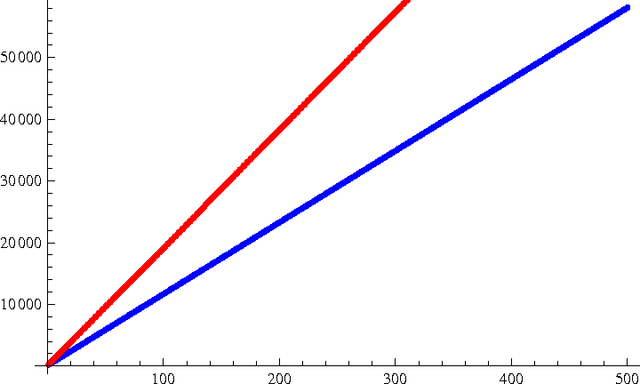Damjan Kalajdzievski
The Logical Implication Steering Method for Conditional Interventions on Transformer Generation
Feb 05, 2025Abstract:The field of mechanistic interpretability in pre-trained transformer models has demonstrated substantial evidence supporting the ''linear representation hypothesis'', which is the idea that high level concepts are encoded as vectors in the space of activations of a model. Studies also show that model generation behavior can be steered toward a given concept by adding the concept's vector to the corresponding activations. We show how to leverage these properties to build a form of logical implication into models, enabling transparent and interpretable adjustments that induce a chosen generation behavior in response to the presence of any given concept. Our method, Logical Implication Model Steering (LIMS), unlocks new hand engineered reasoning capabilities by integrating neuro-symbolic logic into pre-trained transformer models.
Scaling Laws for Forgetting When Fine-Tuning Large Language Models
Jan 11, 2024Abstract:We study and quantify the problem of forgetting when fine-tuning pre-trained large language models (LLMs) on a downstream task. We find that parameter-efficient fine-tuning (PEFT) strategies, such as Low-Rank Adapters (LoRA), still suffer from catastrophic forgetting. In particular, we identify a strong inverse linear relationship between the fine-tuning performance and the amount of forgetting when fine-tuning LLMs with LoRA. We further obtain precise scaling laws that show forgetting increases as a shifted power law in the number of parameters fine-tuned and the number of update steps. We also examine the impact of forgetting on knowledge, reasoning, and the safety guardrails trained into Llama 2 7B chat. Our study suggests that forgetting cannot be avoided through early stopping or by varying the number of parameters fine-tuned. We believe this opens up an important safety-critical direction for future research to evaluate and develop fine-tuning schemes which mitigate forgetting
A Rank Stabilization Scaling Factor for Fine-Tuning with LoRA
Nov 28, 2023Abstract:As large language models (LLMs) have become increasingly compute and memory intensive, parameter-efficient fine-tuning (PEFT) methods are now a common strategy to fine-tune LLMs. A popular PEFT method is Low-Rank Adapters (LoRA), which adds trainable low-rank "adapters" to selected layers. Each adapter consists of a low-rank matrix product, multiplicatively scaled by a rank-dependent factor. This scaling factor, which divides adapters by a factor of the rank, results in slowed learning and stunted performance for LoRA with higher-rank adapters. Consequently, the use of LoRA in practice has generally been limited to very low ranks. In this work, we study the impact of the scaling factor on the learning process and prove that LoRA adapters should be divided by a factor of the square root of the rank. Modifying LoRA with the appropriate scaling factor, which we call the rank-stabilized LoRA (rsLoRA) method, easily provides for a fine-tuning compute/performance trade-off, where larger ranks can be used to trade off increased computational resources during training for better fine-tuning performance, with no change in inference computing cost.
Transfer Entropy Bottleneck: Learning Sequence to Sequence Information Transfer
Nov 29, 2022Abstract:When presented with a data stream of two statistically dependent variables, predicting the future of one of the variables (the target stream) can benefit from information about both its history and the history of the other variable (the source stream). For example, fluctuations in temperature at a weather station can be predicted using both temperatures and barometric readings. However, a challenge when modelling such data is that it is easy for a neural network to rely on the greatest joint correlations within the target stream, which may ignore a crucial but small information transfer from the source to the target stream. As well, there are often situations where the target stream may have previously been modelled independently and it would be useful to use that model to inform a new joint model. Here, we develop an information bottleneck approach for conditional learning on two dependent streams of data. Our method, which we call Transfer Entropy Bottleneck (TEB), allows one to learn a model that bottlenecks the directed information transferred from the source variable to the target variable, while quantifying this information transfer within the model. As such, TEB provides a useful new information bottleneck approach for modelling two statistically dependent streams of data in order to make predictions about one of them.
Measurability Aspects of the Compactness Theorem for Sample Compression Schemes
Jul 17, 2012
Abstract:It was proved in 1998 by Ben-David and Litman that a concept space has a sample compression scheme of size d if and only if every finite subspace has a sample compression scheme of size d. In the compactness theorem, measurability of the hypotheses of the created sample compression scheme is not guaranteed; at the same time measurability of the hypotheses is a necessary condition for learnability. In this thesis we discuss when a sample compression scheme, created from com- pression schemes on finite subspaces via the compactness theorem, have measurable hypotheses. We show that if X is a standard Borel space with a d-maximum and universally separable concept class C, then (X,C) has a sample compression scheme of size d with universally Borel measurable hypotheses. Additionally we introduce a new variant of compression scheme called a copy sample compression scheme.
 Add to Chrome
Add to Chrome Add to Firefox
Add to Firefox Add to Edge
Add to Edge